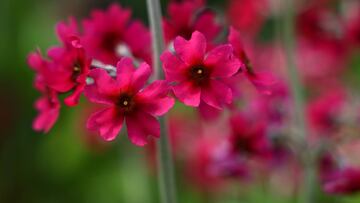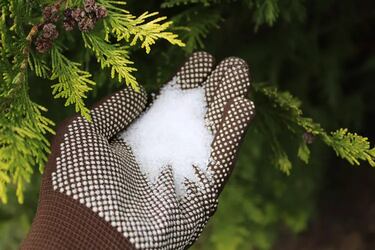Does this surprising ingredient lead to healthier, more colorful plants and flowers?
Within the garden community, there appears to be disagreement on the benefits of Epsom salt, a mineral more commonly associated with bath salts.


Gardening experts are torn on the benefits of using magnesium sulfate heptahydrate - better known as Epsom salt - to help plants and flowers grow. While, on the one hand, it has been claimed that Epsom salt leads to “more colorful, healthier blooms”, dissenters dismiss this as a dangerous myth, warning that people risk ruining their gardens if they turn to the substance.
What is Epsom salt?
Named after the British town where it was first found in soils and springs back in the 17th century, Epsom salt is a naturally-occurring mineral that contains magnesium, sulfur and oxygen.
What is Epsom salt commonly used for?
Epsom salt is most typically used in households as a bath salt, and is said to help humans who bathe in it by easing stress and relieving muscle pain. However, question marks surround these reported advantages. Citing the sports medicine physician Dr George Eldayrie, Forbes magazine’s Heidi Borst writes that “further research […] is needed” before such benefits can be scientifically confirmed.
There appears to be stronger evidence that a soak in Epsom-salted water can help to heal minor wounds. The foot and ankle surgeon Dr Bruce Pinker warns Forbes, though, that it must not be used to treat deep or infected wounds.
Meanwhile, there are claims that humans can benefit from detoxifying effects if they drink a solution of Epsom salt dissolved in water. However, Medical News Today’s Lana Barhum notes that there is “no credible evidence” supporting this. The only scientifically corroborated advantage of drinking Epsom salt, Barhum says, “is as a laxative when someone is constipated”.
It seems clear, then, that Epsom salt is a mineral whose benefits are far from gaining universal acceptance within the medical community. And this is equally true of its status in the horticultural world, where conflicting advice is available to green-fingered Americans seeking to bring out their garden’s full potential.

Does Epsom salt help in gardening?
“Plants absorb nutrients more efficiently”
In an article published in The Spruce, a dedicated home-improvement magazine, the professional gardener Les Engels recommends Epsom salt as a substance that helps to improve “soil quality and promote plant growth”.
“This easy-to-use natural option contains magnesium and sulfur, essential nutrients […],” he adds. “When dissolved in water and applied to the soil, Epsom salt helps plants absorb these nutrients more efficiently, leading to vibrant flowers and better plant health.”
Engels recommends diluting one or two tablespoons of the mineral in a gallon of water, before pouring it into the soil around things like vegetable plants, tomato plants, and roses. In some cases, he also suggests spraying the solution on plants’ leaves.
“None of these recipes are based on science”
Writing in the Old Farmers’ Almanac, a more than 200-year-old publication that specializes in gardening, cooking, weather, and lunar cycles, the horticultural expert Robin Sweetser contradicts Engels’ advice.
Soil needs enough magnesium so that plants can generate the chlorophyll required for photosynthesis, Sweetser explains, while sufficient sulfur is necessary “to form some vitamins and plant proteins”. However, she cites academic studies that indicate that Epsom salt is not effective in improving plant growth in magnesium and sulfur-deficient soils.
Sweetser also points out that gardens in North America rarely suffer from sulfur deficiency. “If sulfur is overdone, it will build up in the soil and make it hard for plants to use the other nutrients they need,” she says. If your soil is low on sulfur, Sweetser recommends using manure rather than Epsom salt.
A shortage of magnesium is unlikely to be an issue either, says a 2018 paper by Washington State University horticulturalists Linda Chalker-Scott and Rich Guggenheim. “Urban soils - including those in home gardens and landscapes - are rarely deficient” in the substance, Chalker-Scott and Guggenheim declare.
Related stories
“If you add Epsom salts to soil that already has sufficient magnesium, this can harm plants and contaminate the soil,” Sweetser cautions.
Chalker-Scott and Guggenheim agree that the use of Epsom salt “could create soil nutrient imbalances and cause substantial injury to plants”, concluding: “There are many online recipes for using Epsom salt as a fertilizer, to treat physiological problems, such as blossom end rot, and to prevent transplant shock […]. None of these recipes are based on science”.


Complete your personal details to comment